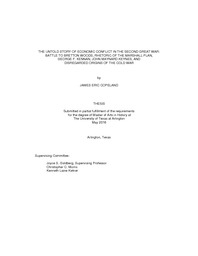
ATTENTION: The works hosted here are being migrated to a new repository that will consolidate resources, improve discoverability, and better show UTA's research impact on the global community. We will update authors as the migration progresses. Please see MavMatrix for more information.
Show simple item record
| dc.contributor.advisor | Goldberg, Joyce S. | |
| dc.creator | Copeland, James Eric | |
| dc.date.accessioned | 2016-07-08T21:05:27Z | |
| dc.date.available | 2016-07-08T21:05:27Z | |
| dc.date.created | 2016-05 | |
| dc.date.issued | 2016-05-12 | |
| dc.date.submitted | May 2016 | |
| dc.identifier.uri | http://hdl.handle.net/10106/25809 | |
| dc.description.abstract | Reflecting back in his Memoirs, George F. Kennan, wrote that the document that propelled his career was dispatched after a telegram informed the U.S. embassy in Moscow that the “Russians were evidencing an unwillingness to adhere to the World Bank and International Monetary Fund.” Kennan’s provocative narrative was published in 1967, more than two decades after he sent the famous Long Telegram. He published his Memoirs during the turbulence of the 60s, around the time President Johnson announced he would not seek re-election. By the time of publication, the Cold War narrative was entrenched in anti-Marxist rhetoric and any re-examination of the origin of the Cold War was subdued. Analysis of the Long Telegram in relation to World Bank remained unexplored. Two decades after Kennan published his Memoirs in 1986, the U.S. Government declassified a telegram he dispatched prior to the Long Telegram in January 1946. It was simply titled: “551 Bretton Woods Telegram.”
The origin of the Cold War was the Soviet decision not to join the World Bank. Negotiations for the Bretton Woods Agreement began in February 1942, when John Maynard Keynes sent the U.S. Treasury his Proposals for an International Clearing Union. To understand the Soviet decision not to join the World Bank historians need to review the debates between the United States and Great Britain that led to Bretton Woods.
Because the Soviet Union did not to join the World Bank, the United States created the National War Planning College and developed the Strategy of Containment. The rhetoric to convince Congress and the public to fund the Marshall Plan led to the development of neoclassical economic theory, which thwarted Keynes’ theory of internationalism promoted by global currency stabilization. | |
| dc.format.mimetype | application/pdf | |
| dc.language.iso | en_US | |
| dc.subject | Bretton Woods | |
| dc.subject | Marshall Plan | |
| dc.subject | Kennan | |
| dc.subject | Keynes | |
| dc.subject | Cold War | |
| dc.subject | Gold Standard | |
| dc.subject | World Bank | |
| dc.subject | World War II | |
| dc.title | The Untold Story of Economic Conflict in the Second Great War: Battle to Bretton Woods, Rhetoric of the Marshall Plan, George F. Kennan, John Maynard Keynes, and Disregarded Origins of the Cold War | |
| dc.type | Thesis | |
| dc.degree.department | History | |
| dc.degree.name | Master of Arts in History | |
| dc.date.updated | 2016-07-08T21:07:34Z | |
| thesis.degree.department | History | |
| thesis.degree.grantor | The University of Texas at Arlington | |
| thesis.degree.level | Masters | |
| thesis.degree.name | Master of Arts in History | |
| dc.type.material | text | |
| dc.creator.orcid | 0000-0003-3180-6157 | |
Files in this item
- Name:
- COPELAND-THESIS-2016.pdf
- Size:
- 3.022Mb
- Format:
- PDF
This item appears in the following Collection(s)
Show simple item record


